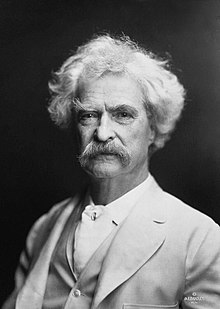
Back Mark Twain Afrikaans Mark Twain ALS Марк Твен ALT ማርክ ትዌይን Amharic Mark Twain AN مارك توين Arabic مارك توين ARZ মাৰ্ক টোৱেইন Assamese Mark Twain AST Mark Twain AVK
Mark Twain | |
|---|---|
 Twain in 1907 | |
| Born | Samuel Langhorne Clemens November 30, 1835 Florida, Missouri, U.S. |
| Died | April 21, 1910 (aged 74) Stormfield House, Redding, Connecticut, U.S. |
| Resting place | Woodlawn Cemetery, Elmira, New York, U.S. |
| Pen name |
|
| Occupation |
|
| Language | American English |
| Period | Modern |
| Genres | |
| Literary movement | American Realism |
| Years active | from 1863 |
| Employers | |
| Spouse | |
| Children | 4, including Susy, Clara, and Jean |
| Parents | |
| Relatives | Orion Clemens (brother) |
| Signature | |
 | |
Samuel Langhorne Clemens (November 30, 1835 – April 21, 1910),[1] known by the pen name Mark Twain, was an American writer, humorist and essayist. He was praised as the "greatest humorist the United States has produced,"[2] with William Faulkner calling him "the father of American literature."[3] His novels include The Adventures of Tom Sawyer (1876) and its sequel, Adventures of Huckleberry Finn (1884),[4] with the latter often called the "Great American Novel." Twain also wrote A Connecticut Yankee in King Arthur's Court (1889) and Pudd'nhead Wilson (1894), and co-wrote The Gilded Age: A Tale of Today (1873) with Charles Dudley Warner.
Twain was raised in Hannibal, Missouri, which later provided the setting for both Tom Sawyer and Huckleberry Finn. He served an apprenticeship with a printer early in his career, and then worked as a typesetter, contributing articles to his older brother Orion Clemens' newspaper. Twain then became a riverboat pilot on the Mississippi River, which provided him the material for Life on the Mississippi (1883). Soon after, Twain headed west to join Orion in Nevada. He referred humorously to his lack of success at mining, turning to journalism for the Virginia City Territorial Enterprise.[5]
He first achieved success as a writer with the humorous story "The Celebrated Jumping Frog of Calaveras County," which was published in 1865; it was based on a story that he heard at Angels Hotel in Angels Camp, California, where he had spent some time while he was working as a miner. The short story brought him international attention.[6] He wrote both fiction and non-fiction. As his fame grew, he became a much sought-after speaker. His wit and satire, both in prose and in speech, earned praise from critics and peers, and Twain was a friend to presidents, artists, industrialists, and European royalty.
Although Twain initially spoke out in favor of American interests in the Hawaiian Islands, he later reversed his position,[7] going on to become vice president of the American Anti-Imperialist League from 1901 until his death in 1910, coming out strongly against the Philippine-American War and colonialism.[8][9][10]
Twain earned a great deal of money from his writing and lectures, but invested in ventures that lost most of it, such as the Paige Compositor, a mechanical typesetter that failed because of its complexity and imprecision. He filed for bankruptcy in the wake of these financial setbacks, but in time overcame his financial troubles with the help of Standard Oil executive Henry Huttleston Rogers. Twain eventually paid all his creditors in full, even though his declaration of bankruptcy meant he was not required to do so. He was born shortly after an appearance of Halley's Comet, and predicted that his death would accompany it as well, dying a day after the comet was at its closest to Earth.[11]
- ^ "Biography of Mark Twain". Archived from the original on June 3, 2017. Retrieved October 28, 2017.
- ^ "Mark Twain is Dead at 74; End Comes Peacefully at His New England Home After a Long Illness". The New York Times. April 22, 1910. ISSN 0362-4331. Archived from the original on August 28, 2023. Retrieved August 28, 2023.
- ^ Jelliffe, Robert A. (1956). Faulkner at Nagano. Tokyo: Kenkyusha, Ltd.
- ^ World Book Encyclopedia. Chicago: World Book, Inc. 1999.
- ^ Thomson, David, In Nevada: The Land, The People, God, and Chance, New York: Vintage Books, 2000. ISBN 0-679-77758-X p. 35
- ^ Twain, Mark (1903). The Jumping Frog: The Jumping Frog, in English, Then in French, Then Clawed Back Into a Civilized Language Once More by Patient, Unremunerated Toil. New York: Harper & Brothers.
- ^ Caron, James E. (2008). "The Blessings of Civilization: Mark Twain's Anti-Imperialism and the Annexation of the Hawai'ian Islands". The Mark Twain Annual (6): 51–52. JSTOR 41582240. Archived from the original on October 31, 2023. Retrieved October 31, 2023 – via JSTOR.
- ^ "Mark Twain – The World of 1898: The Spanish-American War". Hispanic Division, Library of Congress. Archived from the original on October 26, 2022. Retrieved October 26, 2022.
- ^ Stone, Oliver; Kuznick, Peter (2013). The Untold History of the United States.
- ^ Thurber, Dani. "Research Guides: World of 1898: International Perspectives on the Spanish American War: Mark Twain". Library of Congress. Archived from the original on October 31, 2023. Retrieved October 31, 2023.
During the Spanish-American War, Twain became a fervent anti-imperialist, even joining the Anti-Imperialist League. His sentiments about the war and the war in the Phillippines were published nationwide.
- ^ "Mark Twain's weird but perfect ending". PBS NewsHour. April 21, 2022. Archived from the original on July 2, 2023. Retrieved July 2, 2023.
© MMXXIII Rich X Search. We shall prevail. All rights reserved. Rich X Search